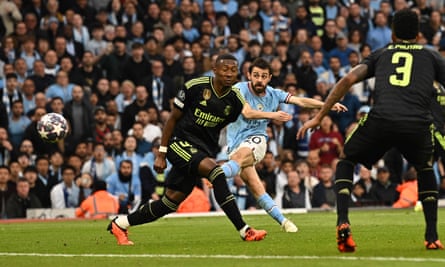In a recent interview with the Hollywood Reporter, the writer and director Justine Bateman spoke about how TV executives now want shows that are interesting enough to be, well, interesting, but not so detailed that the viewer couldn’t also doom scroll without missing any key plot lines.
“I’ve heard from showrunners who are given notes from the streamers that: ‘This isn’t second screen enough,’” she said. “Meaning, the viewer’s primary screen is their phone and the laptop and they don’t want anything on your show to distract them from their primary screen because if they get distracted, they might look up, be confused, and go turn it off. I heard somebody use this term before: they want a ‘visual muzak’.”
Anyone watching Manchester City v Arsenal last weekend could be forgiven for wondering if they’d all been given that memo. Lads, let’s not do too much – the neutrals want to watch us, keep up with the world burning on X while someone makes a homemade Bic Mac on TikTok. Arguably the players took it a step too far – fans reaching for a third and fourth screen just to take their mind away from William Saliba’s defensive masterclass over on the big telly.
The way we consume football, sport, everything – has changed so much in the last few years. I can’t even remember a time where I just sat and watched a game on the TV or in the ground without the urge to send some tediously predictable tweet that 300 people have already posted.
Back in my childless UK life I’d give up the first screen to Mrs Rushden. The Apprentice on the TV, Champions League main game on the laptop – prop the phone on the bottom right hand corner of the computer. Headphones in one ear, and hoping that the side kicking from left to right on the Macbook didn’t attack down the near side too much – a quick counter might be entirely hidden by a tiny version of Inter v Atléti buffering away on the phone. Not that it generally mattered, I was too busy watching another Brylcreemed master of business walking backwards out of the boardroom while bowing, “thank you Lord Sugar for the opportunity”.
Now in Australia with a toddler and a 5am kick off for Monday Night Football – the TV is currently reserved for season one of Tractor Ted on a loop – I really know how silage is made these days. The game plays on a laptop hidden behind a cushion, so young Ian Rush(den) only gets addicted to one screen at a time.
This coming Tuesday the culprits of the most boring game of all time (in the last week) Manchester City and Arsenal are competing for our divided attention where on paper we have two perfectly set up Champions League quarter-finals kicking off at the same time.
The holders at the Bernabéu while Arsenal host Harry Kane, Eric Dier and the wounded but dangerous Bayern Munich. How then to approach such a feast of football? Presuming not many of you will be in a giant TV studio with a multitude of equally giant screens – then you have a choice to make. Two games where, for once, you don’t need to invent a narrative.
It is simply ludicrous how many times Bayern have knocked Arsenal out at this stage of the competition. It began to feel like an every season occurrence. PSG implode, City win everything, Bayern knock out Arsenal. In reality it’s happened on four occasions – 2005, 2013, 2014 and 2017 – culminating in those two 5-1s – the Germans scoring five in the second half at the Emirates, seemingly relegating Arsenal into the Champions League wilderness – bringing back memories of those simpler times where every football conversation was essentially about whether Arsène Wenger should stay or go.

This time – it is a different Arsenal, and a game with a really easy storyline. Either they shatter Harry Kane’s latest bid for a trophy or the England captain halts the Gunners search for a first ever European Cup. No one else can have a say here. Whoever scores, whoever wins, the camera will focus on Kane at the end. As Spurs and England fans know, when the camera zooms in on Kane at the end, he is more often than not applauding stoically, mournfully to the fans who have stayed to give their appreciation despite another heartbreaking disappointment.
Over in Madrid it’s part III of a trilogy following the semi-finals of the last two seasons. An epic opening act in 2022 – Thibaut Courtois somehow keeping Jack Grealish out, before two goals in a minute from Rodrygo and then Karim Benzema breaking their hearts. And then last year where City blew Madrid away in the first half. It’s worth watching it again. Without getting too hyperbolic – it felt like a changing of the guard, or to take it to the ultimate extreme, the day where Luka Modric finally got tired.
after newsletter promotion
City are bigger and stronger and maybe a bit stodgier this year – perhaps that’s the recency bias of last week. But their games are exciting when the opposition don’t just sit back, however naive that might be. You sense that despite Carlo Ancelotti’s pragmatism, with Jude Bellingham, Vinícius Jr and Rodrygo they will go for it – especially at home.
It’s an impossible choice – and a shame they clash. The obvious danger in trying to watch two games is that you end up watching neither. Perhaps only the great multi-taskers of our age are able to take in both games and both commentaries at the same time.
Journalist, broadcaster, and one of my favourite Norwegians, Lars Sivertsen, suggests having the volume up of your second choice game – that way your eyes can focus on Real v City, while your ears can draw you to the Emirates if Bukayo Saka is closing in on goal. Of course you can commit to one, but beware FOMO kicking in – what if it’s more exciting on the other channel? And once you start flicking, what if you miss the best bits of both?
Perhaps the best advice is to make your choice, and then abandon your phone – the odds are both these games will deserve your attention – we are not at the stage where the TV execs are worried about a football match not being third screen enough. Not yet anyway.
Source: theguardian.com


